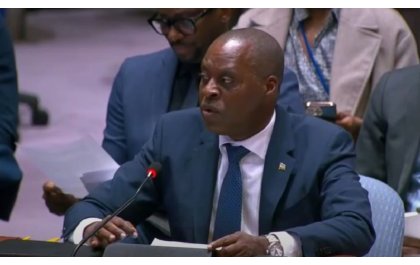Rwanda’s ambassador to the United Nations, Ernest Rwamucyo, has sharply criticized the UN Security Council and its peacekeeping mission in the Democratic Republic of Congo (DRC), MONUSCO, for their failure to curb escalating violence and instability in eastern DRC. His remarks, delivered during a special Security Council session this week, underscore deepening regional tensions as fighting intensifies and accusations of foreign interference mount.
MONUSCO’s “Deviation” from Mandate
Ambassador Rwamucyo condemned MONUSCO, which has operated in the DRC for 26 years, for allegedly abandoning its core mandate to protect civilians and dismantle armed groups. He singled out the Democratic Forces for the Liberation of Rwanda (FDLR), a militia linked to perpetrators of the 1994 Rwandan genocide, as a persistent threat that MONUSCO has failed to neutralize. Over 250 armed groups operate in eastern DRC, with the FDLR accused of collaborating with Congolese forces (FARDC) to destabilize Rwanda.
“MONUSCO has not only failed to address root causes of instability but has aligned itself with FARDC, which partners with genocidal forces like the FDLR,” Rwamucyo asserted. He criticized the mission’s reported involvement in joint operations with FARDC, which he claims exacerbates conflict rather than fostering peace.
M23 Resurgence and Cross-Border Accusations
Tensions have spiked following renewed clashes involving the M23 rebel group, which recently declared its intent to seize Goma, a strategic eastern DRC city. Rwanda denies DRC’s allegations of backing M23, with Rwamucyo stating, “Rwanda has no troops in DRC and no interest in military intervention.” However, DRC Foreign Minister Thérèse Kayikwamba Wagner countered, accusing Rwanda of direct involvement in the conflict—a charge Kigali dismisses as “baseless.”
The violence has claimed international peacekeepers’ lives, including nine South African soldiers under the Southern African Mission in DRC (SAMIRDC) and three Malawian troops. An Uruguayan peacekeeper was also recently killed, highlighting risks to regional stabilization efforts.
Calls for Accountability and Humanitarian Crisis
Rwamucyo urged the UN to hold MONUSCO accountable, emphasizing that its “support for armed groups breaches international law and undermines peace.” He called for refocusing the mission on civilian protection and disengagement from FARDC’s contentious alliances.
The Security Council session unfolded amid one of eastern DRC’s worst humanitarian crises, with millions displaced and vulnerable communities trapped in crossfire. The region’s instability, rooted in decades of resource conflicts and ethnic violence, remains unresolved despite billions spent on peacekeeping.
Rwanda reiterated its commitment to regional stability but warned that MONUSCO’s perceived failures and DRC’s collaboration with armed groups risk further escalation. Meanwhile, the DRC insists Rwanda’s alleged support for M23 perpetuates the cycle of violence.
As diplomatic tensions flare, the Security Council faces mounting pressure to reassess its approach. With MONUSCO’s mandate under scrutiny and violence surging, the international community’s next steps—or inaction—could determine whether eastern DRC edges closer to peace or prolonged chaos.



